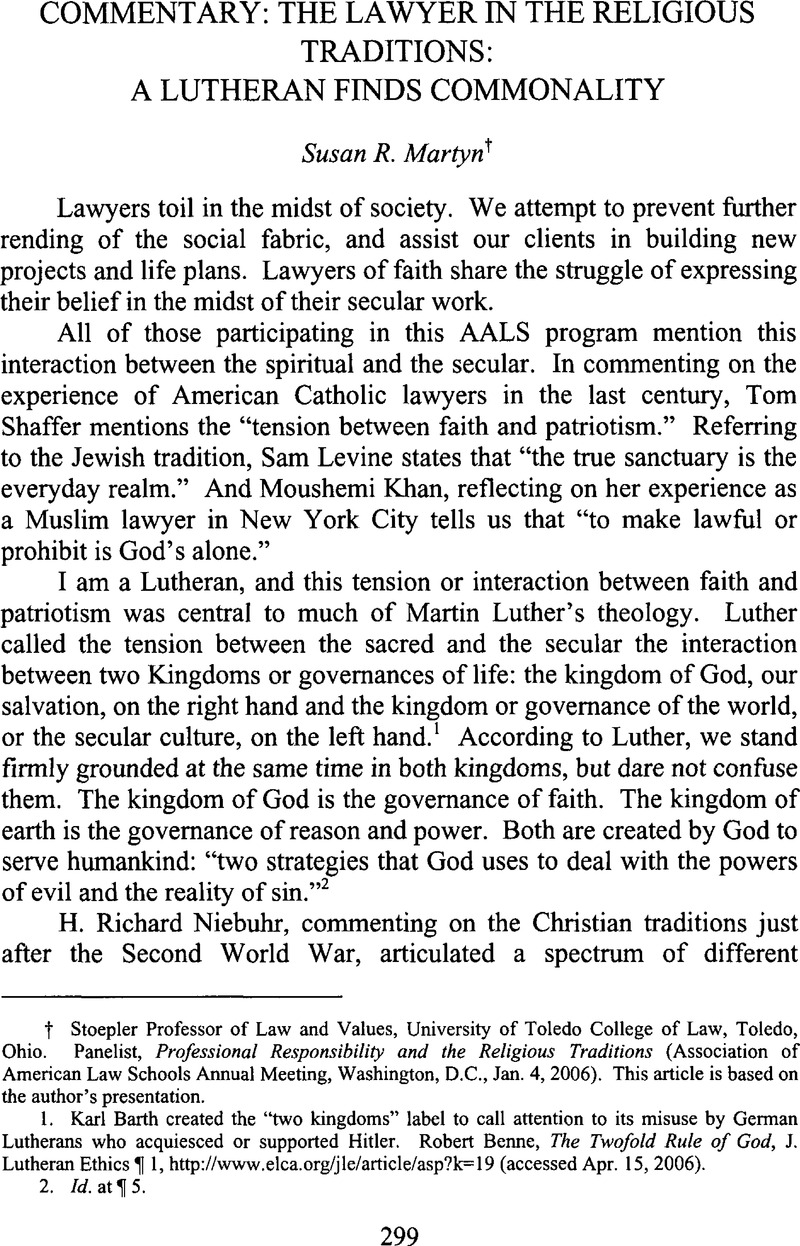No CrossRef data available.
Published online by Cambridge University Press: 24 April 2015

1. Karl Barth created the “two kingdoms” label to call attention to its misuse by German Lutherans who acquiesced or supported Hitler. Benne, Robert, The Twofold Rule of God, J. Lutheran Ethics ¶ 1, http://www.elca.org/jle/article/asp?k=19 (accessed Apr. 15, 2006)Google Scholar.
2. Id. at ¶ 5.
3. Niebuhr, H. Richard, Christ and Culture xi (Harper & Row 1951)Google Scholar. Niebuhr's title focuses on the Christian experience. Since I attempt here to identify some common themes in all religious belief, I have taken the liberty to translate his Christian terminology to “faith,” meaning a spiritual belief in an ultimate reality beyond secular existence.
4. Id. at 45-82.
5. Id. at 47-48.
6. Id. at 65-67.
7. Id. at 67.
8. Id.
9. Id. at 75-76.
10. Id. at 83-115.
11. Id. at 83.
12. Id. at 86.
13. Id. at 85. Niebuhr also added “Cultural Protestants,” including John Locke, Thomas Jefferson and Immanual Kant as well as an entire bevy of 19th century theologians. Id. at 91-93.
14. Id. at 93.
15. Id. at 116-148.
16. Id. at 149-189.
17. Id. at 190-229.
18. Bainton, Roland H., Here I Stand: A Life of Martin Luther 79-83, 121 (Abington-Cokesbury Press 1950)Google Scholar.
19. Id. at 268-285.
20. Id. at 379-380. In 1994, the Evangelical Lutheran Church in America adopted a statement on Lutheran-Jewish relations that frankly identified and rejected Luther's anti-Semitism, including its influence on the Holocaust “suffered by Jews in places where the Lutheran churches were strongly represented.” The entire statement is reproduced in Martyn, Susan R., Are we Moving in the Right Dimension? Sadducees, Two Kingdoms, Lawyers and the Revised Model Rules of Professional Conduct, 34 Val. U. L. Rev. 121, 129 n. 58 (1999)Google Scholar.
21. Failinger, Marie, A Foolish Vocation, J. Lutheran Ethics, http://wwwtest.elca.org/jle/article.asp7k436 (accessed Apr. 2006)Google Scholar; Turtle, Robert, Whether Lawyers, Too, Can Be Saved, J. Lutheran Ethics, http://www.elca.org/jle/article.asp?k=445 (accessed July 5, 2006)Google Scholar.
22. Bonhoeffer, Dietrich, Letters and Papers from Prison 193 (Bethge, Eberhard ed., Fuller, Reginald H. trans., rev. ed. SCM Press 1967)Google Scholar.
23. Pannenberg, Wolfhart, Theology and the Kingdom of God 115 (Westminster Press 1964)Google Scholar. Pannenberg points out that “Adolf Eichman insisted at his trial that he had always acted according to Kant's imperative” because he “envisioned the extermination of the Jewish people as a universal law to be universally followed.” Id. at 104.
24. One commentator characterizes Luther as distinguishing the two kingdoms as a means to remind us that God “rules the world in a two-fold way.” Althaus, Paul, The Ethics of Martin Luther 51 (Schultz, Robert C. trans., Fortress Press 1972)Google Scholar.
25. Niebuhr, supra n. 4, at 255.
26. Luther actually said: “Sin for all you are worth. God can forgive only a lusty sinner.” He meant that “an unblemished record engenders the worst of all sins, pride.” Bainton, supra n. 25, at 225-226.
27. Cf. Marino, Gordon, An Ethics Consult With Kierkegaard, 23 Crim. J. Ethics 2, 58 Summer/Fall 2004)Google Scholar. (“For Kierkegaard, an ethicist would have to lie in fear and trembling squared, first for the fact of his own infinite culpability, second, because he has some level to share in the moral responsibility of the person or corporation he is advising.”).
28. Joseph Laconte, Nearer My God to the G.O.P., N.Y. Times Op-Ed ¶ 12 (Jan. 2, 2006).